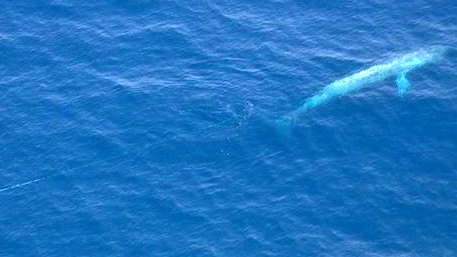Entangled blue whale finally found on third day of exhaustive search.
A boat off the coast of Mexico apparently spotted the blue whale that rescuers first saw several days ago entangled in hundreds of feet of fishing line near Palos Verdes, California, south of Los Angeles.
A blue whale trailing line and a red buoy was seen around 10:30 a.m. about 18 miles southwest of the Coronado Islands, Jim Milbury, a spokesman for the U.S. National Oceanic and Atmospheric Administration, confirmed to the Associated Press.
“We may be able to respond if the whale moves back into U.S. waters, but for now we will be in contact with another rescue team in Mexico,” Milbury said.
He said that rescue team’s range, however, is south of the whale last reported location.
It hasn’t been confirmed that the whale spotted today is the same one seen Friday, but Peter Wallerstein of Marine Animal Rescue, which led the rescue effort on Friday, told City News Service that given the description of the buoy, it’s a good possibility that it is.
Marine Animal Rescue donated equipment to rescue teams in Mexico a couple of years ago because “they had a lot of gray whales getting entangled in fishing nets during their migration to Baja,” Wallerstein said.
He said attaching the larger buoy was the right move, despite concerns that it has added to the whale’s burden.
“I’m still happy with that. That’s why they spotted the whale,” he said.
Smaller gray whales have been rescued from entanglements, but no one had ever tried to rescue a blue whale before, Wallerstein said.
Blue whales are believed to be the largest mammals to have lived on the planet, measuring about 80 feet on average, which makes rescues extremely dangerous.
Asked why a locator beacon wasn’t attached to the whale on Friday when rescuers used poles with knives attached to try to free the colossal cetacean, he said one was at the ready, but the National Marine Fisheries Service denied permission for it to be deployed.
He didn’t know the rationale behind that decision and Milbury did not immediately respond to a message asking why permission was denied.
“We were ready to do that,” Wallerstein said. “We had it with us and were ready.”
Agencies/Canadajournal
 Canada Journal – News of the World Articles and videos to bring you the biggest Canadian news stories from across the country every day
Canada Journal – News of the World Articles and videos to bring you the biggest Canadian news stories from across the country every day



